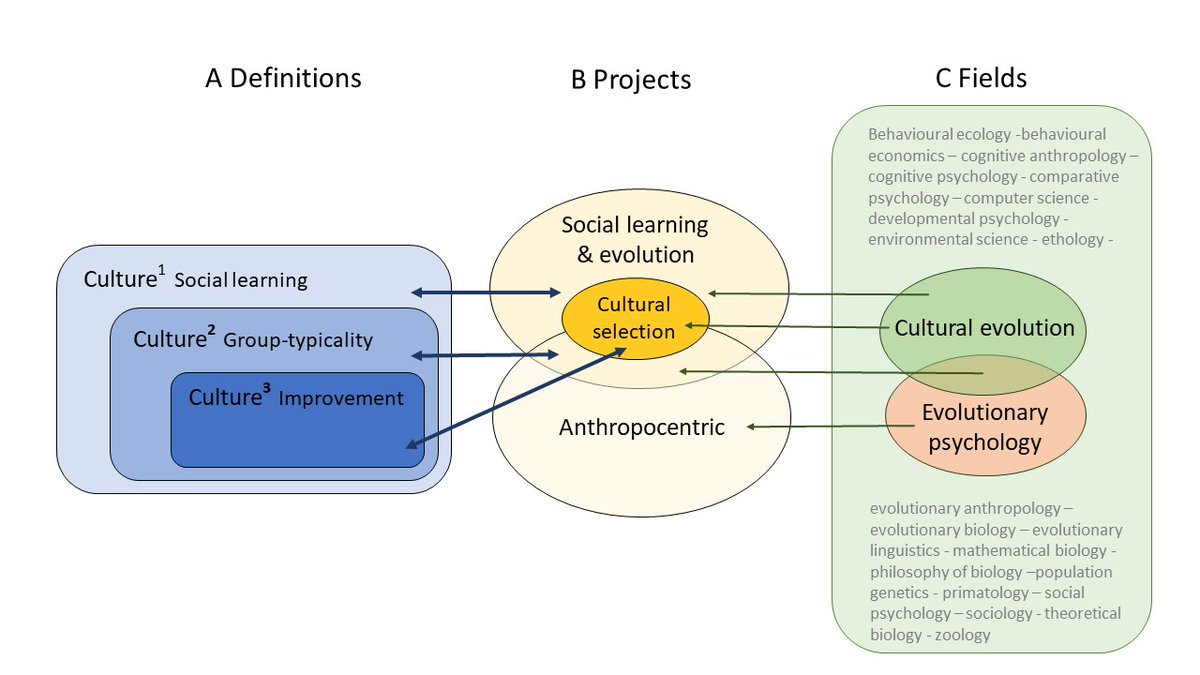What is culture? A primer on how and why cultural evolutionists define culture.
https://psyarxiv.com/v8ms3/
https://psyarxiv.com/v8ms3/&qu... href="https://twitter.com/CulturalEvolSoc">@CulturalEvolSoc @EES_update
Thread.
https://psyarxiv.com/v8ms3/
Thread.
‘Culture’ refers to: 1) behaviour acquired through social learning; 2) socially learned behaviours shared by the members of a group; or 3) socially learned behaviours that are shared and have improved over episodes of social learning. @amesoudi
https://royalsocietypublishing.org/doi/full/10.1098/rspb.2018.0712">https://royalsocietypublishing.org/doi/full/...
https://royalsocietypublishing.org/doi/full/10.1098/rspb.2018.0712">https://royalsocietypublishing.org/doi/full/...
Culture1 is everywhere - eg snails are capable of social learning. This definition is used to explore the impact of social learning on evolutionary dynamics. Culture1 has very little to do with what most people, in science and on the street, think of as culture.
There is evidence of Culture2 in primates and other mammals, fish and birds. This definition is anthropocentric. It& #39;s used to identify phylogenetic, ecological, social and cognitive factors yielding the group-typical behaviour, belief and technology found in humans.
Fine review of Culture2 in nonhuman animals here @LucyMAplin https://www.sciencedirect.com/science/article/pii/S2352154616301632">https://www.sciencedirect.com/science/a...
Some argue that Culture3 (aka ‘cumulative culture’) is uniquely human @CTennie, while others see signs of Culture3 in the tool use of great apes and corvids. Striking experimental evidence of Culture3 comes from pigeons. @Taka_Sasaki_ @dora_biro_ https://www.nature.com/articles/ncomms15049">https://www.nature.com/articles/...
Culture3 serves the anthropocentric project and the ‘cultural selection project’. The latter asks whether, anywhere in the animal kingdom, Darwinian selection occurs in the cultural domain.
https://royalsocietypublishing.org/doi/full/10.1098/rstb.2017.0051">https://royalsocietypublishing.org/doi/full/...
https://royalsocietypublishing.org/doi/full/10.1098/rstb.2017.0051">https://royalsocietypublishing.org/doi/full/...
The anthropocentric and cultural selection projects shouldn& #39;t be confused. Picky social learners, using complex cognition to decide what to copy, are ok for the anthropocentric project, but cultural selection requires short-sighted social learners.
Humans learn to imitate, to represent mental states (theory of mind) and to evaluate cognition processes (metacognition) through social interaction - suggesting complex cognitive processes are fruits rather than seeds of cultural selection. https://journals.sagepub.com/doi/full/10.1177/0963721420917736?casa_token=tvh7XZbDh80AAAAA%3ABJ6nP9Hhf1vYFETjRP1h1Gntu9EEQ6-eMXz-UNgPXfWO79aaMlDK4G1On-s8n7lw31SRmHHhkPkKng">https://journals.sagepub.com/doi/full/...
In a slogan, we humans are smart because we& #39;re cultured, rather than cultured because we& #39;re smart.
Culture has inflated. Culture1 is relatively new, and Culture2 used to be called ‘traditions’. Increasing use of Culture3 protects two significant explanatory projects: to work out what makes human lives so unusual, and whether Darwinian evolution occurs in the cultural domain.

 Read on Twitter
Read on Twitter @CulturalEvolSoc @EES_updateThread." title="What is culture? A primer on how and why cultural evolutionists define culture. https://psyarxiv.com/v8ms3/&qu... href="https://twitter.com/CulturalEvolSoc">@CulturalEvolSoc @EES_updateThread." class="img-responsive" style="max-width:100%;"/>
@CulturalEvolSoc @EES_updateThread." title="What is culture? A primer on how and why cultural evolutionists define culture. https://psyarxiv.com/v8ms3/&qu... href="https://twitter.com/CulturalEvolSoc">@CulturalEvolSoc @EES_updateThread." class="img-responsive" style="max-width:100%;"/>


